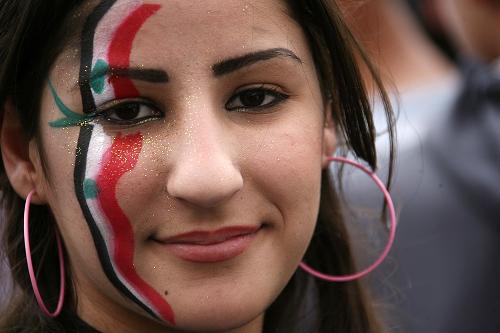Syrian president proposes constitutional referendum
 0 Comment(s)
0 Comment(s) Print
Print E-mail Xinhua, February 16, 2012
E-mail Xinhua, February 16, 2012
Syrian President Bashar al-Assad issued a presidential decree Wednesday, setting Feb. 26 as the date for a referendum on a new draft constitution.
 |
|
A woman, whose face is painted with the national Syrian flag, attends a rally in support of President Bashar al-Assad in central Damascus on February 15, 2012. [Xinhua/AFP] |
Meanwhile, opposition leaders refused to participate in the referendum, stressing that stopping the violence is the top priority at present.
Assad received a copy of the draft constitution Sunday from the head of a national committee entrusted with drafting a new constitution, the state-run news agency SANA said, adding that after the president reviews the draft, it would be referred to the People's Assembly before being put up for a referendum.
According to Syrian state television, the draft constitution contains 157 articles divided into six basic parts: rights and freedom, rule of law, state authorities, the constitutional court, amendments to the constitution, and other general provisions.
It said the draft constitution stipulates that Syria's political system should be based on the principle of political pluralism and a democratic exercise of power through balloting boxes, and that any political activity or the establishment of parties and political gatherings should not be on a religious, sectarian, tribal or factional basis.
It also limits the presidential terms to a maximum of two seven-year mandate, and has canceled Article 8, which states that the ruling Baath party is the leader of the Syrian nation and society.
The draft constitution also stipulates that parliamentary elections would be conducted within 90 days after the endorsement of the new constitution in a public referendum.
To respond to Assad's plan, the head of the opposing National Coordination Body for Democratic Change, an umbrella for 15 opposition groups in Syria and in exile, said "We will neither participate in the referendum nor in the upcoming elections."
"The priority is for halting violence along with the ongoing killing as well as releasing detainees," the organization's head Hassan Abdul-Azim said, stressing that "most of the opposition figures would refuse to participate in the referendum."
In Washington, the White House dismissed Syria's planned referendum on the new constitution as ludicrous.
"It's actually quite laughable, it makes a mockery of the Syrian revolution," White House spokesman Jay Carney told reporters aboard Air Force One en route to the U.S. state of Wisconsin.
"And it's clear that Syria's future will not include Assad. It's not a question of if, it's just a question of when," Carney said.
As a response, Syrian Ambassador to Russia Riad Haddad said Assad would not resign under any circumstances.
There was no possibility Assad would step down because "the president is legitimate and was elected by a majority of the Syrian population," Haddad told reporters in Moscow.
He also said Damascus was against international peacekeepers' presence in the country.
On the same day, Russian Foreign Minister Sergei Lavrov defended his country's position on Syria and warned against pushing a regime change in Syria.
"The demand of a regime change is the direct way to even more deaths," Lavrov said at a joint conference with Austrian Foreign Minister Michael Spindelegger in Vienna.
"That's the way to full civil war," Lavrov said.
An international presence must be given consent by all parties of the conflict, said Lavrov, calling for a political dialogue among all Syrians.
Regarding the fact that some parts of the opposition in Syria refused to sit at the negotiating table, Lavrov said, "We must demand the people, who carry the weapons, to stop the violence."
Earlier, Lavrov said peacekeepers could be deployed in Syria only when the country's authorities and opposition reached agreement on a ceasefire.
The amendment to the articles of the constitution has been one of the main demands of Syrian protesters and would pave the way for the formation of parties besides the Baath party and 11 other closely associated parties known as the National Progressive Front.
Assad pledged in a national speech on Jan. 10 that the new constitution would focus on the pluralism of political parties and institutions. He also promised to hold a referendum on the new constitution at the beginning of March.






Go to Forum >>0 Comment(s)